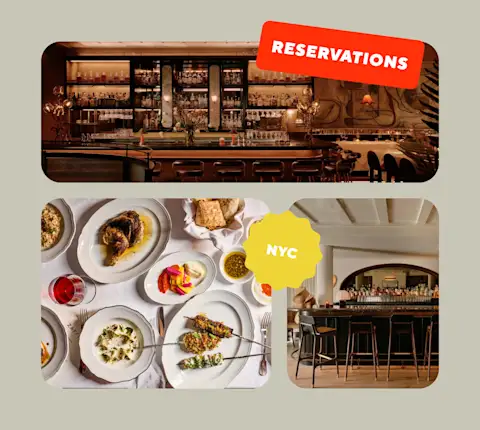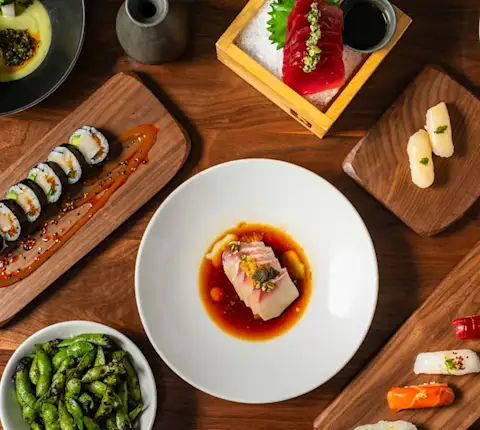When Bogota Latin Bistro’s owners, Farid Ali and George Constantinou, set out to open their first restaurant in the early 2000s, they faced “rejections at every level — money, real estate — you name it,” Ali explains. Everyone told them “no.” But nearly 20 years later, Bogota is a staple of Brooklyn’s Park Slope neighborhood, they have four more restaurants to their names, and plans for two more spaces in the works.
Ali and Constantinou connected at a speed dating event in 2001. “We had very similar backgrounds,” Constantinou explains. Both of their mothers are from Latin America — Constantinou’s from Costa Rica and Ali’s from Colombia. And their fathers are from the eastern Mediterranean — Constantinou’s dad is Greek Cypriot and Ali’s is Palestinian.
“It’s not easy. There are challenges that we're still figuring out. At the end of the day, we created so much together, [including] our family — you’ve got to make it work.”
Their first trip as a couple was to see Ali’s family in Bogota, Colombia. While Constantinou was meeting relatives, he was also trying dishes like blood sausage and chinchulín (fried cow intestines) and taking notes. From the early days of their relationship, he wanted to open a restaurant, but Ali wasn’t certain. He worked in tech and graphic design at a law firm and was hesitant to give up benefits and a regular paycheck.
Still, he found a Workshop in Business Opportunities (WIBO) program for $90 and they enrolled. By graduation 16 weeks later, they had a business plan for Bogota Latin Bistro, which they submitted to the Brooklyn Public Library’s business competition, PowerUp! They took home first place, which came with $10,000 and the same amount in in-kind services.

“That validated our idea,” Constantinou says. But it “was a journey for the next year to just try to find someone who would give us money.” At one point, they had 30 or so loan rejection letters from different banks — including the bank that had sponsored the competition, but told them they couldn’t offer a loan because restaurants are “risky.”
Eventually, they met a banker — “a very masculine guy in a suit,” Constantinou recalls — at a bank in downtown Manhattan. When he asked if they planned to serve frozen margaritas, Constantinou and Ali looked at one another. They hadn’t planned on it since the drink isn’t Colombian, but they said yes. “Us gay[s]... love frozen margaritas,” the banker said. Forty-five minutes later, the duo had secured a $100,000 loan.
Finding a location was just as tricky as securing the loan; nearly 20 landlords turned them down since they had no track record of owning a restaurant. Struggling with the rejection and second-guessing his decision to leave a stable job, Ali went for a walk on a Sunday and ended up on 5th Avenue in Park Slope, near where he lived as a kid. He asked someone standing in the doorway of an empty storefront if they knew of any spaces for rent and was told that very space was going on the market on Monday. “Park Slope chose us,” Ali explains.
Everyone told them “no.” But nearly 20 years later, Bogota is a staple of Brooklyn’s Park Slope neighborhood.
They documented their journey and struggles opening the restaurant on a now long lost blog, which drew quite a following, Constantinou remembers. And while the restaurant was under construction, they decorated the windows with dishes they planned to serve and scenery of Colombia, which they changed out weekly.
That generated buzz and on opening night, 200 people showed up. “We couldn’t handle it — it was a failure,” Constantinou says. The food took too long to reach the tables and the team was running through dishes so quickly that ice cream melted on hot plates fresh from the dishwasher. Ali and Constantinou wondered what they had signed up for.
But they regrouped and eventually found their rhythm. At the time, there were no Colombian restaurants that they knew of in that area of Brooklyn, and, though they thought the cuisine would resonate with diners, they decided to throw in menu items that might be more familiar to the neighborhood — a Cuban dish, a Puerto Rican dish, and a Dominican dish. They didn’t want anyone “to walk away from a Colombian restaurant saying, ‘I don't see something I know or like there.’”

“I think we tapped into something,” Constantinou explains. “We were gay-owned; we added this hospitality, a friendliness — one of our walls was hot pink, and back then, no one was really doing that.”
In 2011, they became fathers to twins born through surrogacy. And at work, “we thought we had the golden touch, that no matter what we did people would follow,” Ali says. But they didn’t when the pair opened a tapas place called Miti Miti nearby a few years later. “For some reason that didn’t hit in Park Slope. It was really painful walking past this restaurant. Bogota was kicking ass and [Miti Miti] was just empty.” Constantinou suggested they switch the concept to Mexican and the restaurant started to fill up quickly.
In 2018, they opened Miti Miti Street Food in northern New Jersey, and the next year, Medusa the Greek in Park Slope. The plan was to open a new restaurant every year, but then the pandemic hit. “It was a nightmare,” Constantinou says.
"We were gay-owned; we added this hospitality, a friendliness — one of our walls was hot pink, and back then, no one was really doing that.”
The duo prides themselves on looking after their staff, offering a 401k, competitive health insurance, team outings, and a party they call “teamsgiving,” on the Monday before Thanksgiving. But the pandemic forced them to lay off 110 staffers, some of whom had been with them for close to 15 years. “I have a gray beard because of COVID — [it] was an amazing case study on perseverance," Constantinou says.
It would have been easy to throw in the towel, he adds, but they kept going and are currently working on two new spaces: A Greek one in New Jersey slated to open before the end of the year, and, next door to Bogota, a rotisserie chicken spot called Dirty Birdy Chicken. They’re also working on a gyro spinoff of Medusa the Greek, which they hope to debut early in 2024.
Their latest challenge is navigating those openings as business partners and co-parents, but not as a couple, having ended their romantic relationship a year ago. “It’s not easy. There are challenges that we're still figuring out,” Constantinou says. “At the end of the day, we created so much together, [including] our family — you’ve got to make it work.”
Order from Bogota Latin Bistro*This article includes mentions of merchants who are partners of DoorDash, and DoorDash may receive a commission if you choose to make a purchase from these merchants.





